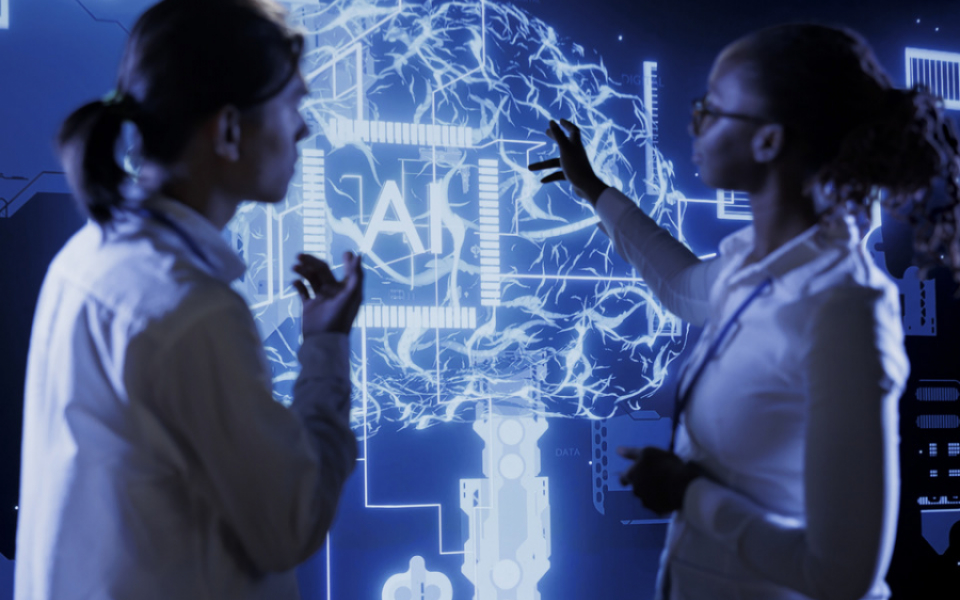Artificial Intelligence (AI) is no longer a futuristic concept—it’s already transforming how we live, work, and interact with the world. From smart assistants in our homes to advanced algorithms that help businesses make smarter decisions, AI is revolutionizing our daily tasks. This article explores how AI is seamlessly integrating into everyday life, simplifying our routines, and improving efficiency across various sectors. Whether you’re aware of it or not, AI is already a part of your daily life, and its influence will only continue to grow in the coming years.
1. AI in Personal Assistants: Making Life Easier
One of the most noticeable AI innovations in everyday life is the integration of AI-powered personal assistants like Amazon’s Alexa, Apple’s Siri, Google Assistant, and Microsoft’s Cortana. These smart assistants use natural language processing (NLP) to understand spoken commands and carry out various tasks. Here’s how they make life easier:
- Voice Commands: Set reminders, make calls, send texts, or play music with simple voice commands.
- Home Automation: AI integrates with smart home devices, allowing users to control lights, temperature, security systems, and even kitchen appliances hands-free.
- Information Retrieval: AI assistants can instantly search for information, answer questions, and even provide news updates, weather forecasts, and traffic reports.
By performing these daily tasks, AI-powered assistants enhance convenience and save time, making them an essential part of modern life.
2. AI in Smart Homes: Bringing Automation to Your Living Space
Smart homes are one of the most exciting applications of AI in daily life. Through AI-driven devices and systems, homes are becoming more intelligent and efficient. Here’s how AI is transforming the way we live at home:
- Smart Thermostats: AI-powered thermostats like Nest can learn your temperature preferences and adjust settings automatically, ensuring comfort while optimizing energy consumption.
- AI Security Systems: AI-enabled security cameras and alarms can detect unusual behavior or faces, providing enhanced security.
- Smart Kitchens: AI-powered kitchen devices, such as refrigerators and ovens, can suggest recipes based on the ingredients you have, monitor food expiration, and even order groceries for you.
These AI technologies create smarter, more energy-efficient homes, offering both convenience and sustainability.
3. AI in Transportation: Smarter Travel Solutions
The way we travel is changing rapidly, and AI is at the forefront of this revolution. From ride-hailing apps to autonomous vehicles, AI is reshaping transportation and making travel more efficient, safer, and convenient.
- Ride-Hailing Services: Apps like Uber and Lyft use AI to match riders with drivers, calculate optimal routes, and predict demand patterns for quicker and more efficient service.
- Autonomous Vehicles: Self-driving cars, powered by AI algorithms, are set to revolutionize personal and public transportation by reducing accidents, improving traffic flow, and increasing accessibility.
- Smart Traffic Management: AI algorithms are being used to optimize traffic signals and predict traffic patterns in cities, reducing congestion and enhancing road safety.
These innovations will significantly improve how we move around in the future, making travel safer and more efficient.
4. AI in Healthcare: Revolutionizing Patient Care

AI is making significant strides in the healthcare industry, where it is being used to enhance diagnostics, predict health outcomes, and improve patient care. Here are a few ways AI is already making a difference:
- AI Diagnostics: Machine learning algorithms can analyze medical images, such as X-rays and MRIs, to detect conditions like cancer, heart disease, and neurological disorders more accurately and faster than human doctors.
- Personalized Medicine: AI is enabling more personalized treatments by analyzing individual patient data, such as genetic information, to recommend the most effective therapies.
- Health Monitoring: Wearable devices, powered by AI, monitor vital signs, track fitness, and provide real-time alerts to both users and doctors about potential health issues.
These advancements not only improve the accuracy of diagnoses but also help prevent illnesses and promote better overall health.
5. AI in E-Commerce: Personalized Shopping Experience
AI is also revolutionizing the world of online shopping. E-commerce giants like Amazon, eBay, and Shopify use AI to enhance the shopping experience and make personalized recommendations:
- Personalized Recommendations: AI analyzes past purchase history, browsing behavior, and user preferences to suggest products tailored to individual shoppers.
- Chatbots for Customer Service: AI-driven chatbots assist customers by answering questions, providing product recommendations, and even processing orders 24/7.
- Predictive Analytics: AI tools predict trends, demand, and inventory needs, allowing e-commerce businesses to optimize stock and streamline supply chains.
By leveraging AI, e-commerce platforms can provide a personalized, seamless shopping experience that drives customer satisfaction and loyalty.
6. AI in Entertainment: Enhancing Content Consumption
AI is enhancing how we consume entertainment, from recommending movies and music to creating personalized playlists. Here are some ways AI is enhancing the entertainment experience:
- Content Recommendations: Streaming services like Netflix and Spotify use AI algorithms to analyze your watching or listening history and recommend shows, movies, or music based on your preferences.
- AI in Gaming: AI-powered video games are creating more realistic and immersive experiences by adapting gameplay based on player behavior and choices.
- Personalized News Feeds: AI algorithms curate news and social media content based on your interests and past interactions, making your feed more relevant and engaging.
These AI-driven experiences are transforming how we consume media and interact with entertainment.
7. AI in Finance: Smarter Financial Management
In the world of finance, AI is improving everything from managing personal finances to enabling better investment strategies. Here’s how AI is changing the financial landscape:
- Smart Banking Apps: AI-powered financial apps help users track spending, manage budgets, and save money more efficiently.
- Fraud Detection: AI algorithms monitor financial transactions in real-time, detecting unusual activity and preventing fraud.
- Automated Trading: AI is increasingly used in stock trading to analyze market trends, predict price movements, and execute trades with minimal human intervention.
These innovations make financial management more accessible, secure, and efficient for individuals and businesses alike.
8. Ethical and Privacy Considerations of AI in Everyday Life
As AI becomes an integral part of everyday life, it’s important to consider the ethical implications and privacy concerns surrounding its use:
- Data Privacy: AI systems rely on large amounts of personal data to function effectively. It’s crucial to ensure that this data is protected and used responsibly.
- Bias in AI: AI algorithms can sometimes reflect the biases in the data they’re trained on, leading to unfair outcomes in areas like hiring, lending, or healthcare.
- Accountability: As AI systems become more autonomous, questions about responsibility and accountability will need to be addressed, especially in critical applications like healthcare or transportation.
As AI continues to advance, addressing these ethical concerns will be key to ensuring its positive impact on society.
Also Read: Exploring Ai Innovations: What’s Next For Artificial Intelligence In 2025?
Conclusion: The Future of AI in Everyday Life
AI is already revolutionizing our daily tasks, and its influence will only continue to expand as we move into the future. From smart homes to personalized shopping and healthcare, AI is making our lives more convenient, efficient, and connected. However, as AI becomes a bigger part of everyday life, it’s essential to address ethical concerns, data privacy, and bias to ensure that its benefits are realized in a fair and responsible way.
As we embrace these changes, it’s clear that AI is not just a technological trend—it’s the future of how we interact with the world around us.

